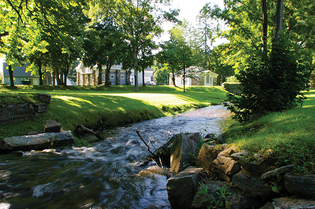
Mathew Solanch
In the summertime, Ellen Battell Stoeckel’s estate houses gifted musicians, singers, and artists, where they are taught by experts.
View full image
If you’ve never been to the Yale School of Music’s summertime Norfolk Chamber Music Festival, you’re missing something marvelous. True, you might live a long way from Connecticut, and yes, Norfolk requires an extended afternoon drive from New Haven, and okay, perhaps you’re not as fond of chamber music or choral singing as some people are. So come for the beauty of the place—the old stone bridges, the ancient trees, the forget-me-nots in the grass. You’ll be delighted.
The Norfolk Festival takes place on an expansive and beautifully cared-for area of land and buildings that were bequeathed to Yale by Ellen Battell Stoeckel (1851–1939). She and her husband, Carl Stoeckel (1858–1925), loved music. (Carl was the son of Gustave Stoeckel, the first music professor in Yale’s School of Music.) They brought chamber music players and singers into their mansion to perform, and they attracted a sizeable audience. Eventually, the couple commissioned an architect to build a larger performance space. When Ellen died, childless, she left instructions that her estate would remain in a private trust and that Yale would use the land and the buildings every summer for a music school and other artistic activities. Each year there is also a summer art program run on the estate by the Yale School of Art.
From the front, the Music Shed is a refined brick structure. The first time I walked into it, I was startled to see that the back end is virtually all wood, almost completely unpainted, with rows of rafters showing. Anyone might assume it started out as a barn. But in actuality the hall is elegantly resounding, perhaps because it’s a small place with a high ceiling; sometimes you can almost hear a note vibrating after it stops.
Moreover, the estate is a place that has attracted and continues to attract the likes of Midori, Jean Sibelius, Sergei Rachmaninoff, Pamela Frank, the Emerson String Quartet—the list is always growing.
The in-person Norfolk Festival stopped altogether in the summer of 2020, but 2022 brought it back. My husband and I attended two concerts (both instrumental, though the festival also teaches choral singing). The first night had apparently been reworked, since every printed program had been replaced by a loose-leaf sheet. It was a night emphasizing Sibelius. Pianist and festival director Melvin Chen played the famous Finlandia, a triumphant, uplifting work meant to bolster Finns who were living under Russian rule. Chen played with the fury of the sea crashing against cliffs in a storm.
Less well known are the short, poignant works for violin and piano that Sibelius wrote at the height of his fame. Chen accompanied the rising young star Grant Houston, who played four of the pieces as ethereally as mist. The audience kept so quiet that it seemed we were holding our breath throughout.
The next night began with a composer I’d never heard of, Erwin Schulhoff (1894–1942), whose sextet for two violins, two violas, and two cellos is past my ability to describe. Schulhoff’s disjointed, dissonant music was full of strange tones, rhythms, and unexpected silences, and I found myself listening to every note and every empty, eerie pause in a way I never had before. It was like trying to decode the moon. (I looked up Schulhoff later on. He was Jewish. The Nazis imprisoned him, and he died of tuberculosis. His music has been all but forgotten. I’m glad the Norfolk Festival brought back one of his compositions, and I hope they’ll continue with more.)
The evening’s finale went to Brahms’s Piano Quartet in A Major, Op. 26. It was one of the most vigorous, dazzling live quartet performances I’ve ever heard, a take-your-breath-away performance. On the opening page of this magazine, the four musicians are shown throwing their arms up in the air, ending the piece exultantly.
If I haven’t convinced you to come for the music, I understand. But don’t forget the forget-me-nots.
 loading
loading